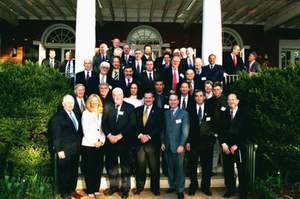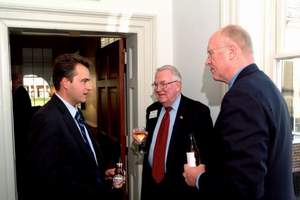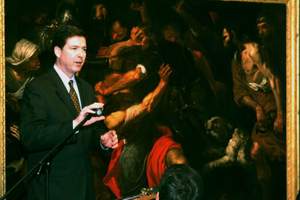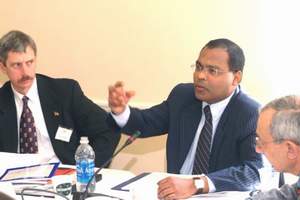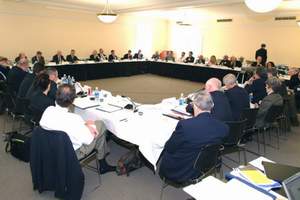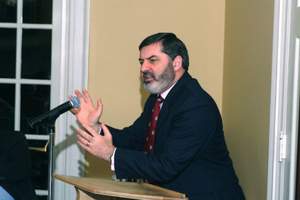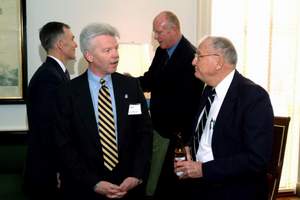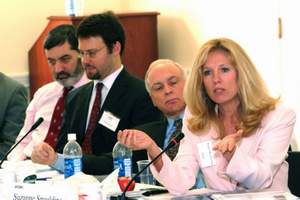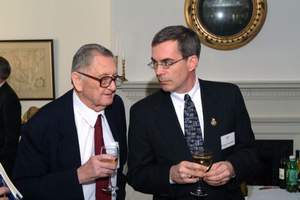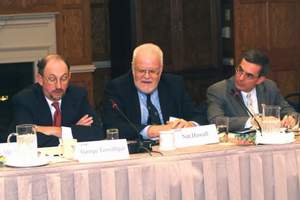Spring 2004 Conference
Countering Suicide Terrorism: Risks, Responsibilities and Realities
Description
University of Virginia
Charlottesville, VA
April 4 to April 6, 2004
The 2004 CIAG conference focused on the potential for suicide terrorism to reach the United States, and the potential for a terrorist focus on so-called ‘soft-targets’. To paraphrase Eric Stern, Director of Crismart at the Swedish National Defense College, we attempted to “focus on the history of our neighbors, in an effort to better understand how we can prepare for the future.”
Highlights
Distinguished Guests
- John, Lord Alderdice – was born in Northern Ireland in 1955, and educated at The Queen’s University of Belfast, graduating in Medicine in 1978. He specialised in psychiatry and psychotherapy and was appointed Ireland’s first Consultant Psychotherapist in 1988 Northern Ireland. He was appointed to the House of Lords in 1996 and sits on the Liberal Democrat benches. Since 2000 has been the Deputy President of Liberal International, the world-wide federation of liberal political parties, and was recently elected to the presidency of that body.
- Mike Brooks – is a correspondent for the CNN News Group based in the network’s headquarters in Atlanta. Subsequent to this, he has served as an independent broadcaster and consultant to a number of entities, including Fox. A criminal justice veteran, Brooks served 26 years with Washington, D.C.’s Metropolitan Police Department, retiring in 1999 as a detective with the intelligence branch. Additionally, for the last six years of his service, he represented the department on the FBI’s joint terrorism task force.
- James Comey – Deputy Attorney General, U.S. Department of Justice
- Rohan Gunaratna – has 18-years of operational, policy and academic experience in counter terrorism. He is Head of Terrorism Research, Institute for Defence and Strategic Studies, Singapore; and Honorary Fellow, International Policy Institute for Counter Terrorism, Israel. He is the principal author of the “Jane’s Counter Terrorism Manual,” a counter terrorism handbook for intelligence and law enforcement personnel and “Inside Al Qaeda: Global Network of Terror” (Columbia University Press, New York).
- Yacov Y. Haimes – Professor of Systems and Information Engineering at the University of Virginia, is the Founding Director (1987) of the University of Virginia’s Center for Risk Management of Engineering Systems, and holds the Lawrence R. Quarles professorship in the School of Engineering and Applied Science. His most recent book is: Risk Modeling, Assessment, and Management, John Wiley & Sons, 1998, second edition 2004. He has worked extensively with the military and domestic agencies on boards and projects.
- Mark Juergensmeyer – is director of Global and International Studies and professor of sociology and religious studies at the University of California, Santa Barbara. He is an expert on religious violence, conflict resolution and South Asian religion and politics, and has published more than two hundred articles and a dozen books. His widely-read Terror in the Mind of God: The Global Rise of Religious Violence (University of California Press, revised edition 2003), is based on interviews with violent religious activists around the world–including individuals convicted of the 1993 World Trade Center bombing, leaders of Hamas, and abortion clinic bombers in the United States
- Andrew C. McCarthy – is an attorney, writer, and senior counter-terrorism consultant at the Investigative Project in Washington, D.C., a foundation that specializes in the analysis of militant Islamic terror groups. He is also serves part-time as a special assistant to the Deputy Secretary of Defense for legal affairs and counter-terrorism. From 1986 through October 2003, Mr. McCarthy was a federal prosecutor at the United States Attorney’s Office for the Southern District of New York (SDNY), where he participated in many of the most significant criminal cases in our nation’s recent history, particularly in the field of national security.
- Peter F. Verga – is the Principal Deputy Assistant Secretary of Defense for Homeland Defense. In this capacity, Mr. Verga is the principal assistant and advisor to the Assistant Secretary of Defense for Homeland Defense on matters related to the overall supervision of the homeland defense activities of the Department of Defense. In addition he is responsible for the day-to-day management of the Department of Defense participation in interagency activities concerning homeland security and Department of Defense relations with the Department of Homeland Security.
Key Panels and Discussions
In order to emphasize that suicide bombing is not in the province of only one culture, a number of cases from distinct cultures were presented. The historic role of suicide bombing was developed, followed by a specific focus on crisis analysis, the military-civilian divide, technical and strategic solutions and finally the communication and its relationship to terror’s contagion.
Representative Insights
“I would strongly advocate that you pay for a lot of airline tickets for members of your congress and your administration to come and listen to people. If you want to budget, don’t even send them to the Middle East, just send them as far as Europe and you’ll start getting the message from your allies, not the ones who agree with you, but the majority of people who don’t. And once you hear it, it doesn’t mean you’ve got to agree with them but it does mean you’ve got to start factoring that into your thinking. One of the things that astonished me when I started to come to the United States was that … most of the Congress didn’t even have a passport.” – Lord John Alderdice
“Well, my view is we are in a war, and make no mistake it’s a war we can, I think, lose pretty easily. So when you’re in a war, one of the things you do is mobilize, and one of the questions is how do you mobilize in this country? Take the law enforcement and military portions of the government…[They] understand viscerally that this is a war and they had reacted, and they reacted to a great extent pretty constructively. But, there are other parts of the country that I think have not mobilized and I made the point yesterday that the Universities have not.” – Anita Jones
“The reason for my optimism is that I think that the kind of culture of violence that I’m talking about really is a fairly ephemeral thing. It’s not grounded in traditional culture, it isn’t traditionally Islamic, not traditionally Christian or Jewish or anything else. It’s a part of a kind of almost fantasy that comes with deep frustration, there’s no question about it, and sometimes it’s entangled in a real movement. It’s not a permanent condition. It can change, and it can dissipate almost as rapidly as it appeared.” – Mark Juergensmeyer
“Martyrdom operations bestow huge benefits upon radical Islam. First of all, they promote a self-sacrificial type of Islam that the radicals can contrast with the so-called corrupt elites they despise. Second, they achieve quick and easy victories and oftentimes high profile victories that answer the need of the Muslim world to seek revenge for perceived humiliations and injuries. Thirdly, they take away at little cost to the attacking organizations the security and comforts of western society, thereby demonstrating to the Muslim world the ephemeral nature of these luxuries, bringing the emphasis back to Muslim spirituality, they nullify the west’s technological superiority and make even this apparent advantage work against the west. Fourthly, they invite the revulsion of the outside non-Muslim world and thus help define for the radicals the boundaries between Islam and infidelity.” – David Cook
“I worry that it’s going to take another mega strike to shock us and the problem with mega strikes is that the immediate aftermath of a mega strike is the absolute worst time to make policy about what you ought to be doing because, you know, your head hurts and your shins hurt and you’re bleeding and you don’t think straight.” – Winston Wiley
“When we had our prison situation in Louisiana in 1999 the subjects asked for cable TV, they asked to communicate with CNN. The convicts wanted to see how they were being portrayed in the media; they wanted to get their message across, so we had to work with the media in that case. The media had more credibility in the eyes of our subjects, and they acted as excellent guarantors that when the prisoners came out they would guarantee they wouldn’t be harmed. The media persuaded the prisoners that they would be treated with dignity and respect, adding that this known and credible reporter will be present to guarantee nothing happens to you… In my view it is our responsibility in law enforcement to work with the media.” – John Flood, FBI Crisis Negotiations Unit
“What we found in our examination of high reliability organizations was that there is a reward in the system for the discovery and the reporting of one’s own error. High reliability organizations are closer to where the hazards are. There you get rewarded for saying you’re wrong. There’s a kind of functional forgiveness that is a basis for lessons learned. Otherwise, you don’t learn them. Lessons come from errors, and errors come from making mistakes. That’s a very big cultural difference.” – Todd LaPorte
Images
- Frank Cilluffo, Edwin Meese and Mike Brooks
- Deputy Attorney General James Comey addresses the Conference participants.
- Rohan Gunaratna speaking during a panel discussion.
- Participants of 2004 CIAG Annual Conference at Newcomb Hall on the campus of the University of Virginia.
- Dinner Keynote Speaker Lord John Alderdice.
- John Flood and Jack Marsh speaking during a break.
- Suzanne Spaulding speaking during a panel discussion.
- Edward Rowny and Greg Saathoff speaking at the University of Virginia Rotunda.
- George Terwilliger, Nat Howell and Greg Saathoff adjourn a successful conference.
- Conference participants posing for a group photograph.

